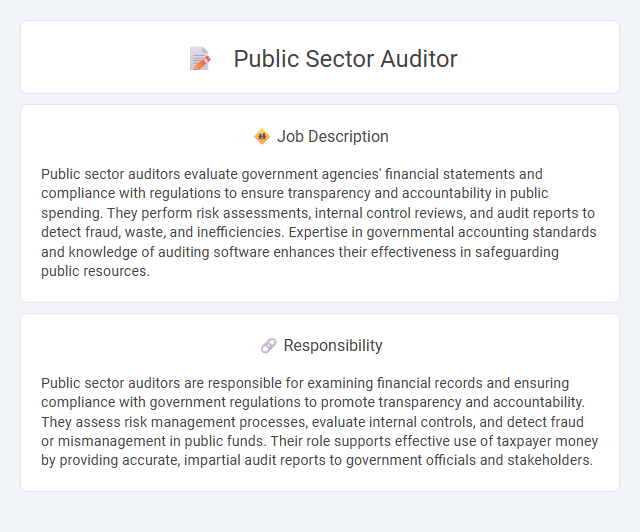
Public sector auditors evaluate government agencies' financial statements and compliance with regulations to ensure transparency and accountability in public spending. They perform risk assessments, internal control reviews, and audit reports to detect fraud, waste, and inefficiencies. Expertise in governmental accounting standards and knowledge of auditing software enhances their effectiveness in safeguarding public resources.
Individuals with strong analytical skills and a detail-oriented mindset are likely suited for a public sector auditor role. Those who prefer structured environments and have an aptitude for understanding governmental regulations may find the job aligns well with their capabilities. People uncomfortable with routine tasks or strict compliance requirements might face challenges adapting to this position.
Qualification
Public sector auditors typically require a bachelor's degree in accounting, finance, or a related field, with many roles favoring candidates holding Certified Public Accountant (CPA) or Certified Internal Auditor (CIA) credentials. Strong knowledge of government regulations, auditing standards such as GAAP and GAS, and proficiency in data analysis tools are essential qualifications. Experience in compliance auditing, risk assessment, and financial reporting within public sector entities enhances job performance and career advancement opportunities.
Responsibility
Public sector auditors are responsible for examining financial records and ensuring compliance with government regulations to promote transparency and accountability. They assess risk management processes, evaluate internal controls, and detect fraud or mismanagement in public funds. Their role supports effective use of taxpayer money by providing accurate, impartial audit reports to government officials and stakeholders.
Benefit
A public sector auditor is likely to benefit from a stable career with government job security and competitive benefits packages. There is a probability of gaining valuable experience in regulatory compliance and financial accountability, which enhances professional growth. Opportunities for public service impact may also increase job satisfaction and community trust.
Challenge
Public sector auditors likely face complex regulatory frameworks that require meticulous attention to detail and deep understanding of government policies. The probability of encountering political pressures or conflicting interests may heighten the difficulty of maintaining objectivity and independence. Challenges could also arise from limited resources and evolving standards that demand continuous professional development.
Career Advancement
Public sector auditors play a critical role in ensuring government accountability and financial transparency by examining public records and compliance with regulations. Career advancement in this field often involves progressing from junior auditor positions to senior roles, such as audit manager or chief auditor, with opportunities to specialize in areas like performance auditing or forensic auditing. Professional certifications like Certified Internal Auditor (CIA) or Certified Government Auditing Professional (CGAP) significantly enhance promotion prospects and leadership potential within public agencies.
 kuljobs.com
kuljobs.com